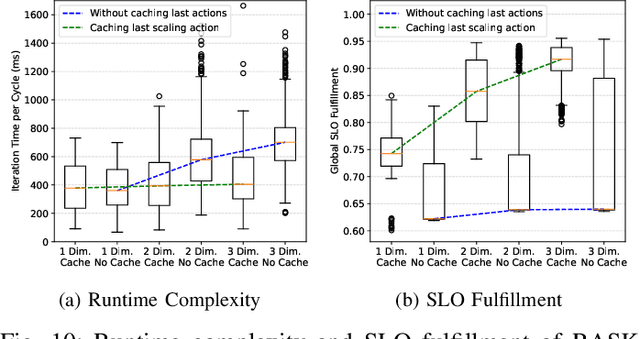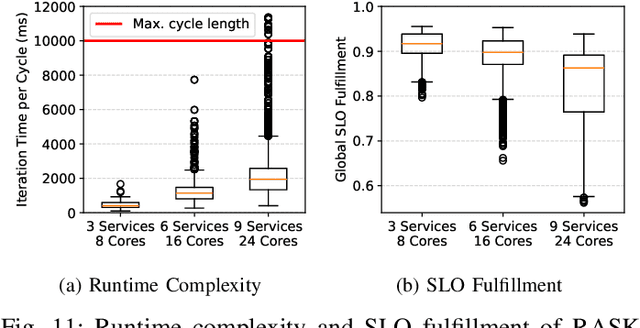Boris Sedlak
Multi-Dimensional Autoscaling of Stream Processing Services on Edge Devices
Oct 08, 2025



Abstract:Edge devices have limited resources, which inevitably leads to situations where stream processing services cannot satisfy their needs. While existing autoscaling mechanisms focus entirely on resource scaling, Edge devices require alternative ways to sustain the Service Level Objectives (SLOs) of competing services. To address these issues, we introduce a Multi-dimensional Autoscaling Platform (MUDAP) that supports fine-grained vertical scaling across both service- and resource-level dimensions. MUDAP supports service-specific scaling tailored to available parameters, e.g., scale data quality or model size for a particular service. To optimize the execution across services, we present a scaling agent based on Regression Analysis of Structural Knowledge (RASK). The RASK agent efficiently explores the solution space and learns a continuous regression model of the processing environment for inferring optimal scaling actions. We compared our approach with two autoscalers, the Kubernetes VPA and a reinforcement learning agent, for scaling up to 9 services on a single Edge device. Our results showed that RASK can infer an accurate regression model in merely 20 iterations (i.e., observe 200s of processing). By increasingly adding elasticity dimensions, RASK sustained the highest request load with 28% less SLO violations, compared to baselines.
Multi-dimensional Autoscaling of Processing Services: A Comparison of Agent-based Methods
Jun 12, 2025Abstract:Edge computing breaks with traditional autoscaling due to strict resource constraints, thus, motivating more flexible scaling behaviors using multiple elasticity dimensions. This work introduces an agent-based autoscaling framework that dynamically adjusts both hardware resources and internal service configurations to maximize requirements fulfillment in constrained environments. We compare four types of scaling agents: Active Inference, Deep Q Network, Analysis of Structural Knowledge, and Deep Active Inference, using two real-world processing services running in parallel: YOLOv8 for visual recognition and OpenCV for QR code detection. Results show all agents achieve acceptable SLO performance with varying convergence patterns. While the Deep Q Network benefits from pre-training, the structural analysis converges quickly, and the deep active inference agent combines theoretical foundations with practical scalability advantages. Our findings provide evidence for the viability of multi-dimensional agent-based autoscaling for edge environments and encourage future work in this research direction.
Benchmarking Dynamic SLO Compliance in Distributed Computing Continuum Systems
Mar 05, 2025Abstract:Ensuring Service Level Objectives (SLOs) in large-scale architectures, such as Distributed Computing Continuum Systems (DCCS), is challenging due to their heterogeneous nature and varying service requirements across different devices and applications. Additionally, unpredictable workloads and resource limitations lead to fluctuating performance and violated SLOs. To improve SLO compliance in DCCS, one possibility is to apply machine learning; however, the design choices are often left to the developer. To that extent, we provide a benchmark of Active Inference -- an emerging method from neuroscience -- against three established reinforcement learning algorithms (Deep Q-Network, Advantage Actor-Critic, and Proximal Policy Optimization). We consider a realistic DCCS use case: an edge device running a video conferencing application alongside a WebSocket server streaming videos. Using one of the respective algorithms, we continuously monitor key performance metrics, such as latency and bandwidth usage, to dynamically adjust parameters -- including the number of streams, frame rate, and resolution -- to optimize service quality and user experience. To test algorithms' adaptability to constant system changes, we simulate dynamically changing SLOs and both instant and gradual data-shift scenarios, such as network bandwidth limitations and fluctuating device thermal states. Although the evaluated algorithms all showed advantages and limitations, our findings demonstrate that Active Inference is a promising approach for ensuring SLO compliance in DCCS, offering lower memory usage, stable CPU utilization, and fast convergence.
Adaptive Active Inference Agents for Heterogeneous and Lifelong Federated Learning
Oct 09, 2024Abstract:Handling heterogeneity and unpredictability are two core problems in pervasive computing. The challenge is to seamlessly integrate devices with varying computational resources in a dynamic environment to form a cohesive system that can fulfill the needs of all participants. Existing work on systems that adapt to changing requirements typically focuses on optimizing individual variables or low-level Service Level Objectives (SLOs), such as constraining the usage of specific resources. While low-level control mechanisms permit fine-grained control over a system, they introduce considerable complexity, particularly in dynamic environments. To this end, we propose drawing from Active Inference (AIF), a neuroscientific framework for designing adaptive agents. Specifically, we introduce a conceptual agent for heterogeneous pervasive systems that permits setting global systems constraints as high-level SLOs. Instead of manually setting low-level SLOs, the system finds an equilibrium that can adapt to environmental changes. We demonstrate the viability of AIF agents with an extensive experiment design, using heterogeneous and lifelong federated learning as an application scenario. We conduct our experiments on a physical testbed of devices with different resource types and vendor specifications. The results provide convincing evidence that an AIF agent can adapt a system to environmental changes. In particular, the AIF agent can balance competing SLOs in resource heterogeneous environments to ensure up to 98% fulfillment rate.
Adaptive Stream Processing on Edge Devices through Active Inference
Sep 26, 2024Abstract:The current scenario of IoT is witnessing a constant increase on the volume of data, which is generated in constant stream, calling for novel architectural and logical solutions for processing it. Moving the data handling towards the edge of the computing spectrum guarantees better distribution of load and, in principle, lower latency and better privacy. However, managing such a structure is complex, especially when requirements, also referred to Service Level Objectives (SLOs), specified by applications' owners and infrastructure managers need to be ensured. Despite the rich number of proposals of Machine Learning (ML) based management solutions, researchers and practitioners yet struggle to guarantee long-term prediction and control, and accurate troubleshooting. Therefore, we present a novel ML paradigm based on Active Inference (AIF) -- a concept from neuroscience that describes how the brain constantly predicts and evaluates sensory information to decrease long-term surprise. We implement it and evaluate it in a heterogeneous real stream processing use case, where an AIF-based agent continuously optimizes the fulfillment of three SLOs for three autonomous driving services running on multiple devices. The agent used causal knowledge to gradually develop an understanding of how its actions are related to requirements fulfillment, and which configurations to favor. Through this approach, our agent requires up to thirty iterations to converge to the optimal solution, showing the capability of offering accurate results in a short amount of time. Furthermore, thanks to AIF and its causal structures, our method guarantees full transparency on the decision making, making the interpretation of the results and the troubleshooting effortless.
Equilibrium in the Computing Continuum through Active Inference
Nov 28, 2023Abstract:Computing Continuum (CC) systems are challenged to ensure the intricate requirements of each computational tier. Given the system's scale, the Service Level Objectives (SLOs) which are expressed as these requirements, must be broken down into smaller parts that can be decentralized. We present our framework for collaborative edge intelligence enabling individual edge devices to (1) develop a causal understanding of how to enforce their SLOs, and (2) transfer knowledge to speed up the onboarding of heterogeneous devices. Through collaboration, they (3) increase the scope of SLO fulfillment. We implemented the framework and evaluated a use case in which a CC system is responsible for ensuring Quality of Service (QoS) and Quality of Experience (QoE) during video streaming. Our results showed that edge devices required only ten training rounds to ensure four SLOs; furthermore, the underlying causal structures were also rationally explainable. The addition of new types of devices can be done a posteriori, the framework allowed them to reuse existing models, even though the device type had been unknown. Finally, rebalancing the load within a device cluster allowed individual edge devices to recover their SLO compliance after a network failure from 22% to 89%.
Active Inference on the Edge: A Design Study
Nov 17, 2023Abstract:Machine Learning (ML) is a common tool to interpret and predict the behavior of distributed computing systems, e.g., to optimize the task distribution between devices. As more and more data is created by Internet of Things (IoT) devices, data processing and ML training are carried out by edge devices in close proximity. To ensure Quality of Service (QoS) throughout these operations, systems are supervised and dynamically adapted with the help of ML. However, as long as ML models are not retrained, they fail to capture gradual shifts in the variable distribution, leading to an inaccurate view of the system state. Moreover, as the prediction accuracy decreases, the reporting device should actively resolve uncertainties to improve the model's precision. Such a level of self-determination could be provided by Active Inference (ACI) -- a concept from neuroscience that describes how the brain constantly predicts and evaluates sensory information to decrease long-term surprise. We encompassed these concepts in a single action-perception cycle, which we implemented for distributed agents in a smart manufacturing use case. As a result, we showed how our ACI agent was able to quickly and traceably solve an optimization problem while fulfilling QoS requirements.
Designing Reconfigurable Intelligent Systems with Markov Blankets
Nov 17, 2023Abstract:Compute Continuum (CC) systems comprise a vast number of devices distributed over computational tiers. Evaluating business requirements, i.e., Service Level Objectives (SLOs), requires collecting data from all those devices; if SLOs are violated, devices must be reconfigured to ensure correct operation. If done centrally, this dramatically increases the number of devices and variables that must be considered, while creating an enormous communication overhead. To address this, we (1) introduce a causality filter based on Markov blankets (MB) that limits the number of variables that each device must track, (2) evaluate SLOs decentralized on a device basis, and (3) infer optimal device configuration for fulfilling SLOs. We evaluated our methodology by analyzing video stream transformations and providing device configurations that ensure the Quality of Service (QoS). The devices thus perceived their environment and acted accordingly -- a form of decentralized intelligence.
 Add to Chrome
Add to Chrome Add to Firefox
Add to Firefox Add to Edge
Add to Edge